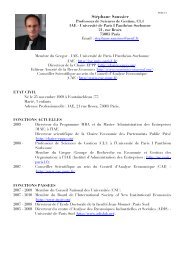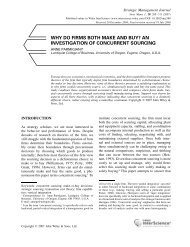Make or Buy Urban Public Transport Services: A Rational Choice?
Make or Buy Urban Public Transport Services: A Rational Choice?
Make or Buy Urban Public Transport Services: A Rational Choice?
Create successful ePaper yourself
Turn your PDF publications into a flip-book with our unique Google optimized e-Paper software.
6 Conclusions<br />
Our objective in this paper was to expl<strong>or</strong>e a question that is central in industrial<br />
<strong>or</strong>ganization: what determines the choice of a specic mode of <strong>or</strong>ganization of public<br />
services provision? Although this issue has generated many the<strong>or</strong>etical developments<br />
especially in an incomplete contract perspective, few empirical studies have analyzed<br />
the trade-o among dierent governance modes in provision of public utilities. Additionally,<br />
to our knowledge, this issue has never been addressed f<strong>or</strong> the urban public<br />
transp<strong>or</strong>t sect<strong>or</strong>.<br />
To expl<strong>or</strong>e what drives the decision to make <strong>or</strong> buy public services, we concentrated on<br />
the French local urban public transp<strong>or</strong>t sect<strong>or</strong> and used a detailed set of data covering<br />
154 cities. Our econometric results are very encouraging. Indeed in a sect<strong>or</strong> in which<br />
most interpretations of the <strong>or</strong>ganizational decisions made by local governments rely<br />
heavily on political fact<strong>or</strong>s, we show that there are rooms f<strong>or</strong> economic explanations.<br />
Our estimates clearly indicate that when deciding whether to provide the service in<br />
house <strong>or</strong> to contract out local auth<strong>or</strong>ities take into account economic eciency considerations.<br />
M<strong>or</strong>e precisely, we provide evidence that cities where outsourcing is likely<br />
to induce high contracting costs (e.g. because the service is hard to specify) tend to<br />
provide the service directly that is through a public bureau. Political considerations<br />
are however not absent from local governments' decisions but our estimates reveal that<br />
they are mostly involved in the trade-o between semi-public and private providers.<br />
In particular, we show that the <strong>or</strong>ganizational modes chosen by neighbouring cities are<br />
key determinants of the decision to privatize. In other w<strong>or</strong>ds, the central make-<strong>or</strong>-buy<br />
decision is driven by economic motives and interest groups' pressure only impacts on<br />
the choice of the external provider; a relatively good news f<strong>or</strong> those who would doubt<br />
the rationality of local politicians.<br />
Although instructive, this study is only a rst step in the analysis of the <strong>or</strong>ganization<br />
of utilities. Future w<strong>or</strong>k should be done to investigate the impact of <strong>or</strong>ganizational<br />
choices on perf<strong>or</strong>mances. Our ambition is indeed to assess the costs and benets of<br />
governance structures assuming that <strong>or</strong>ganizational choices are endogenous, that is to<br />
say, taking into account the determinants of these decisions.<br />
7 References<br />
Bennett, John, and Elisabetta Iossa. 2002. Building and managing facilities f<strong>or</strong> public<br />
services. Journal of <strong>Public</strong> Economics 90(10-11):2143-2160.<br />
Boycko, Maxim, Andrei Shleifer, and Robert W. Vishny. 1996. A the<strong>or</strong>y of pri-<br />
23





